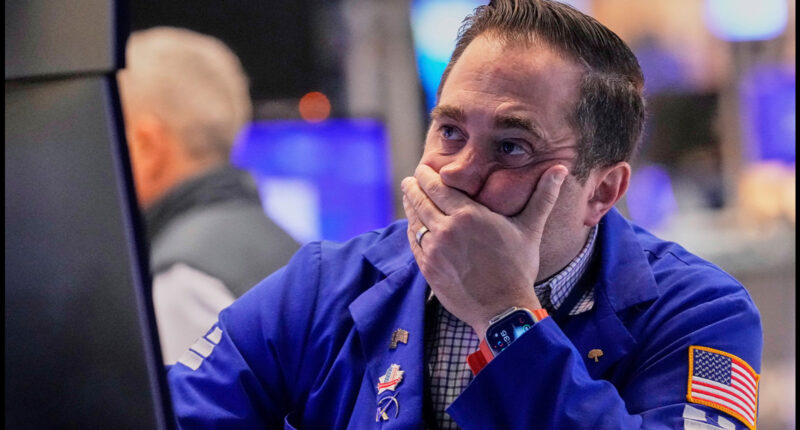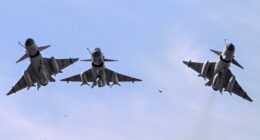Nvidia’s shares are declining today due to new U.S. export restrictions on China, impacting its financial results. The trade war initiated by President Trump is causing uncertainty for businesses worldwide, affecting their forecasts for the year.
The S&P 500 experienced a 2.3% drop in afternoon trading, a significant decrease that would have been considered one of the worst in years before recent volatile market movements.
The Dow Jones Industrial Average was down 657 points, or 1.6%, as of 2 p.m. Eastern time, and the Nasdaq composite was down a market-leading 3.4%.

Specialist Gennaro Saporito works on the floor of the New York Stock Exchange, Wednesday, April 16, 2025.
AP Photo/Richard Drew
The decline intensified following comments from the Federal Reserve chairman, acknowledging that Trump’s tariffs may have a more significant impact than anticipated, potentially leading to economic slowdown and higher inflation. The Fed is evaluating the possibility of lowering interest rates to support the economy, but this action could also exacerbate inflation levels.
“All of this is highly uncertain,” Powell said. “We’re thinking now, really before the tariffs have their effects, (about) how they might affect the economy. That’s why we’re waiting really to see what the policies ultimately are, and then we can make a better assessment of what the economic effects will be.”
MORE | Powell says Federal Reserve can wait on any interest rate moves
Chair Jerome Powell spoke at the Economic Club of Chicago on Wednesday.
Some companies say they’re already seeing real effects from higher barriers to trade.
Nvidia dropped 8.8% after it said the U.S. government is restricting exports of its H20 chips to China, citing worries that they could be used to build a supercomputer. The restrictions could mean a hit of $5.5 billion to Nvidia’s results for the first quarter, covering charges related to inventory and purchase commitments.
Advanced Micro Devices sank 8.5% after it said U.S. limits on exports to China for its own chips may mean a hit of up to $800 million for inventory and other charges.
In Amsterdam, ASML’s stock sank 5.2%. The Dutch company, whose machinery makes chips, said demand for AI is continuing to drive growth. “However, the recent tariff announcements have increased uncertainty in the macro environment and the situation will remain dynamic for a while,” CEO Christophe Fouquet said. ASML also gave a forecast for revenue in the upcoming quarter that fell short of analysts’ expectations.
The uncertainty around Trump’s trade war has been scrambling plans for companies across industries and around the world. It’s so dynamic that United Airlines gave two different financial forecasts for how it may perform this year, one if there’s a recession and one if not.
The airline said it made the unusual move to give twin forecasts because it believes it’s “impossible to predict this year with any degree of confidence.”
United’s stock fell 2% even though it reported a stronger profit for the latest quarter than analysts expected.
Many investors along Wall Street are bracing for a possible recession because of Trump’s tariffs, which he has said he hopes will bring manufacturing jobs back to the United States and trim how much more it imports from other countries than it exports. A survey of global fund managers by Bank of America found expectations for recession are at the fourth-highest level in the last 20 years.
The World Trade Organization said Wednesday it expects tariffs to result in a 0.2% decline in the volume of world merchandise trade for 2025. That’s if the tariff situation remains as it was on Monday. Trade could shrink by 1.5% this year if conditions worsen, the WTO said.
The “enduring uncertainty threatens to act as a brake on global growth, with severe negative consequences for the world, the most vulnerable economies in particular,” Director-General Ngozi Okonjo-Iweala said.
One U.S. company that moves freight, J.B. Hunt Transport Services, tumbled 8.8% for one of Wall Street’s sharper losses even though it reported slightly stronger profit for the latest quarter than analysts expected.
Tariffs could also drive up inflation, at least temporarily, by pushing U.S. importers to pass along the higher costs to their customers.
Fears about such price rises drove a spending binge last month, and sales at U.S. retailers accelerated by more than economists expected. Growth surged to 1.4% in March from February, up from 0.2% the prior month. Economists said much of that was likely because of U.S. shoppers rushing to buy automobiles, electronics and other items before their prices could rise due to possible tariffs.
Recent surveys have shown U.S. households are feeling more pessimistic about the economy because of tariffs, and a fear is that it could lead them to pull back on their spending eventually, which could cause a recession by itself.
Treasury yields eased in the bond market, taking a leg lower following the comments from the Fed’s chair. The yield on the 10-year Treasury fell to 4.29% from 4.35% late Tuesday and from 4.48% at the end of last week.
It’s a return to form for the bond market, which saw an unusual rise in yields last week. That rally had rattled the market and Trump himself, suggesting that the trade war was causing investors worldwide to doubt the reputation of U.S. government bonds as one of the safest possible investments.
In stock markets abroad, indexes fell across much of Asia and were mixed in Europe.
Stocks dropped 1.9% in Hong Kong, 1% in Tokyo, 1.2% in Seoul and 0.1% in Paris.
The FTSE 100 rose 0.3% in London after the government said inflation in the U.K. fell for the second month running in March, largely as a result of lower gas prices.
___
AP Business Writers Matt Ott and Elaine Kurtenbach contributed.
Copyright © 2025 by The Associated Press. All Rights Reserved.

















